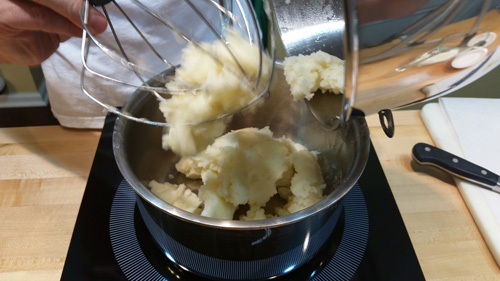The Everyday Chef: How To Make Light & Fluffy Mashed Potatoes
Andrew Dole, RDN, CEC
Everyday Chef, Fruits & Veggies—More Matters

In search of perfect mashed potatoes? There are actually two steps to making light and fluffy mashed potatoes. First, is choosing the correct potato, the most important. Second, the overlooked step of steaming out the potato after boiling. Let’s take a look at the basics for selection (for mashed potatoes and other applications).
Step 1
Choosing the Correct Potato: Waxy vs Starchy
Two different categories of potatoes exist: starchy and waxy. Each type has very different qualities that will make or break your potato recipe.
|
Characteristics …
|
||
|
Starchy Potato
|
Waxy Potato
|
|
|
High Starch Content
Low Moisture Light and Fluffy Good for Deep Frying Gets Crispy |
High Sugar Content
High Moisture Caramelizes Stays Moist Holds Shape |
|
|
What To Buy …
|
||
|
Starchy Potato
|
Waxy Potato
|
|
|
Idaho
Russet All-Purpose Purple Potato |
Red Potato
Yukon Gold Fingerling California White |
|

|
Best Cooking Applications …
|
||
|
Starchy Potato
When you want light, fluffy or thin and crispy |
Waxy Potato
When you want to hold shape or roast cut |
|
|
Mashed Potato
Baked Potato French Fries Potato Chips |
Potato Salads
Au Gratins Roasted Potatoes Hashbrowns Soups & Stews |
|
What Happens If You Use The Wrong Potato?
Thankfully, no kitchen disasters will occur if the wrong potato is used, but the enjoyment and final quality of the meal will suffer.
Waxy Potatoes
This is the wrong potato for fluffy mashed potatoes. Waxy potatoes have lots of moisture. They won’t steam up light and fluffy. When used for mashed potatoes the final product is heavy, wet, and has a darker dingy color. Waxy potatoes also don’t fry well. The high sugar content will brown too quickly and the interior will still be wet or uncooked.
Starchy Potatoes
This is the right potato for fluffy mashed potatoes but the starchy potato is a very poor choice for oven-roasted potatoes or potato salads. The high starch content gets grainy after cooking and when used in a potato salad the stirring breaks down the potato. Instead of perfect cubes you get rounded edges and potato marbles. Roasting wedges of a starchy potato will get a browned, tough outer skin and a sunken dry interior.
Even worse is using a starchy potato in an au Gratin recipe. Instead of wonderful potato layers you end up with potato mush swimming in cream and cheese!
Baked Potatoes? Yes. Starchy potatoes work for baked potatoes because when cooked whole, the steam is trapped inside the whole potato and the flesh is protected by the skin.
Step 2
The Missing Step to Light & Fluffy Mashed Potatoes? Drying
In search of the fluffiest, white mashed potatoes? Add in one extra step – drying – to make all the difference.
After the potatoes are cooked and tender, drain and mash them in a pot. Place that pot over low heat and stir rapidly. This will release the steam trapped in the cooked potato. As the steam leaves the mashed potato they will start to turn white in color and become sandy in texture.
Now that you’ve removed lots of water there is room for cream, butter, buttermilk, sour cream or any number of better tasting things than water.
But don’t add too much liquid or you’ll be right back where you started!

Photo Credit: Andrew Dole


